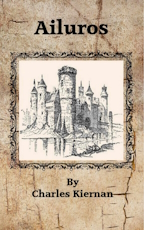White Cat
“Only if I can read a story,” I say.
Thalia and Jini look at me a little curiously.
“OK,” says Thalia cautiously.
“I ran across a story last night,” I explain, “that I think all three of you will enjoy.”
“Three?” Jini asks with a frown.
“He is talking about Ultima,” Thalia fills in.
“Who?” Jini’s perplexed look I find entertaining.
Jini has not been to the Enchanted Forest, our destination for an April picnic that we are planning. The weather is always fine there.
“Ultima,” Thalia explains, “always knows when we are coming, and she will be there.”
“I wonder if she will bring her dragon this time?” I offer.
Jini’s eyes widen.
The story I plan to read is The White Cat, by Contessa d’Aulnoy, or, in other words, a French tale.
There was a king who feared his three clever sons might take away his kingdom for themselves before he intended to let it go. To divert them, he asked that they find him a petite dog to entertain him in his retirement, for which he had no plans.
With goodwill, the three brothers agreed to meet at a certain place in a year’s time and from there return to their father.
Following the adventures of the youngest son, we find him, drenched to the bone, at the door of a mysterious castle, knocking with a deer’s hoof that hung on a diamond-studded chain. Disembodied hands conducted him into the castle and royally dressed him. He was entertained by musicians, all of whom were cats, until the queen of the cats, a white cat, arrived to greet him.
In like manner, the white cat pleased him with all sorts of diversions for a year, at the end of which, she reminded him of his quest. Alarmed at his forgetfulness (He was under a spell.), he pleaded for help, freely given in the form of an acorn in which was the most petite of all dogs.
The young prince was clearly the winner over his brothers. However, the king, unwilling to relinquish the throne, proposed another challenge. He wished for muslin that was so fine that it could pass through the eye of a needle. Off went the brothers on their new quest.
The young prince returned to his white cat and was joyfully received for another year’s stay, at the end of which he was given a walnut, which he assumed held fine muslin. But when he opened it in the presence of his brothers and the king, inside was a hazelnut. Inside the hazelnut was a cherry stone. Inside the cherry stone is its own kernel. Inside the kernel is a wheat grain, and inside the wheat grain is a millet seed.
The young prince began to wonder if the white cat had played a trick on him, but inside the millet seed was a piece of muslin four hundred ells long, woven with wonderful colors and patterns. It did, of course, pass through the eye of a needle.
Once more, the king staved off the inevitable, declaring the sons must go off once again and find brides before one of them could take the throne.
Returning to his white cat, the young prince was appalled when, at the end of a year’s time, she instructed him to cut off her head. With extreme reluctance, he does so, and she transformed into a beautiful princess, the other cats turned into her court, and the disembodied hands into servants.
She then explained the history of her curse. As a child, she had been abducted from her royal parents by the fairies, and they arranged she should marry the king of the dwarves. However, one day, from her tower-prison window, she spied a young prince out hunting. They became friends, then lovers, and at the point of escape, the prince was eaten by the fairies’ dragon.
Furious at her deceit, the fairies returned her to her father’s court, turning them all into cats and hands. The only way to break the spell was to have another prince, identical to her lover, also fall in love with her. And that was what happened.
The young prince returned to his father’s court with his bride. Not only was she clearly the loveliest, but she also told them she had six kingdoms and would give the king one of them, and one for each of the brothers, still retaining three for herself and her new husband.
And so, all ended happily.
Fairy Tale of the Month: April 2024 The White Cat – Part Two
So French
“French!” declares Thalia as I finish the story. We sit along the bank of the Enchanted Forest’s pond. Ultima’s brows knit. “You mean the Franks?” She sits with her back resting against the curled-up bulk of her napping dragon.
“Well,” I say, “in our world, the Franks are the ancestors of the French, the people of France.”
“Are we talking about a province of the Holy Roman Empire?” Ultima quizzes.
“Oh,” says Thalia, “we got rid of them a long time ago.”
“Got rid of?” Ultima’s eyes goggle. “Who would do such a thing?”
“Nationalists,” I reply.
“Well, whatever religion they may be, our dragons would never allow such chaos. I think that’s the trouble with your world; no dragons to keep the order.”
I will not argue the point.
“This tale,” I say, diverting us from anything political, “is really a literary fairy tale by Madame d’Aulnoy, a contemporary of Charles Perrault, a woman not known for fidelity.”
I observe my listeners. Ultima has a raised eyebrow. Thalia is smirking. Jini is staring at the dragon, not hearing a word of my exposition.
I continue.
“Her infidelity was not entirely her fault, I will argue. Her father married her off at fifteen to the Baron d’Aulnoy, thirty years her elder.”
Thalia’s expression dissolves into empathetic distress.
I forge on.
“The baron was accused of treason by two men, both of whom were Madame d’Aulnoy’s lovers. The baron spent three years in the Bastille.”
Thalia’s smirk returns. Ultima’s eyebrow remains raised. Jini continues to be oblivious to everything except the dragon.
“The baron eventually convinced the court that he was innocent and turned the tables on his accusers, who were executed in his stead. Madame d’Aulnoy avoided her arrest warrant by slipping out of a window and hiding in a church. She and her mother, who was also complicit in the scheme, fled the country.
“Her history gets a little murky at this point. She traveled to Spain, Holland, and
England, a hiatus of fifteen years, then was allowed to return to Paris, possibly as repayment for being a spy.
“On returning to Paris, she became a hostess for the salon scene, the gathering of intellectuals and social elites of the day. That was until a close friend was beheaded for trying to murder her abusive husband, she also a victim of an arranged marriage, not unlike Madame d’Aulnoy’s. Accused of being involved, Madame d’Aulnoy escaped being prosecuted, but for the next twenty years, withdrew herself from the Parisian social scene.
“During all this hectic life, she managed to have six children, arguably none of whom were the baron’s, and wrote twelve books of history, fiction (these two categories not clearly distinct in her mind), and fairy tales.
“Her best-remembered works are Contes de fées (1697), which translates into Fairy Tales and Les Contes nouveaux ou les fées à la mode (1698) which translates into New Tales, or the Fancy of the Fairies, similar in style to that of Charles Perrault but laced with her own sardonic touches.”
Ultima’s dragon stirs and looks around sleepily.
Fairy Tale of the Month: April 2024 The White Cat – Part Three
Can I . . .
“Can I touch him?” I hear a hint of fear in Jini’s voice.
“Oh, of course, dearie,” Ultima smiles. “Scratch him behind one of his horns; he likes that.”
As Jini does so, the dragon leans into it, nearly knocking her over.
“What’s his name?” Thalia asks.
“Cedric,” Ultima replies. “But tell me, your white cat does not sound feral.”
“Cats in our world,” I say, “are domesticated. A feral cat is simply homeless.”
Ultima raises a finger in the air. “So I have come to suppose from the evidence in this tale. I think of cats as nasty creatures, but d’Aulnoy’s white cat is all about grace and manners. That was a hard thing for me to swallow.”
“Fairy tales,” I say, “involve the Coleridge adage about ‘the willing suspension of disbelief.’ If you think an element of a story can’t be true, then you miss the truth of the story.”
I see that Jini, totally focused on Cedric, has willingly suspended her disbelief as she strokes his massive snout, now resting on her lap. I am a little nervous for her physical safety—he is so big—but all appears under control.
“The disembodied hands grabbed me. Pun intended,” Ultima winks. “That is a surreal image that sticks in the imagination. A tad frightening, really.”
“I agree.” Anything unnaturally disembodied makes me uneasy.
Ultima’s blank stare indicates contemplation. “I found unusual d’Aulnoy’s treatment of the three brothers. They were always civil with each other. They didn’t fall into murderous sibling rivalry, the expected trope for fairy-tale brothers.”
“Yes,” I say. “None of the biblical Joseph and the many-colored cloak business.”
“A little bit of a shame,” she returns. “It would have added some much-needed tension to the story.”
“Tension?” I query.
“All stories,” Ultima insists, “spoken or written, ought to have some tension in there to keep things interesting.”
I feel my brows automatically frown. “Shouldn’t intellectual content and insight be of enough interest?”
“Nope, sorry, give me tension.”
I sigh. I hear Thalia giggle at my distress.
“The only tension,” Ultima continues, “is the beheading; yet, what is that all about? Gratuitous violence to close out the story? OK, I know it is another trope, but then there is nothing in this story that is not a trope, except the disembodied hand and the kindly brothers.”
“Isn’t that enough to make it unique?”
“Nope.”
I sigh again. Thalia giggles.
“So what about the beheading?” Ultima cocks her head.
This is hard to explain.
“Beheading is an ancient practice to end an antagonist’s existence without honor, held in public. In the fairy tale, the beheading is between two protagonists, in private, for the purpose of transitioning one of them from a spell-state back to their original form, their true being. I think it may be the fairy-tale version of the Christian death and resurrection. The fairy tale, if nothing else, is about transition.”
I see Cedric has gone back to snoozing, his snout still in Jini’s lap, tears of joy streaking down her cheeks.
Your thoughts?





















